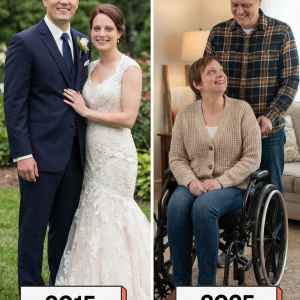When my dad passed, I braced myself for grief—but not for betrayal. Just two days after we laid him to rest, Cheryl, my stepmother, stood in the hallway with cold eyes and a colder voice.
“You can’t stay here. This isn’t your home anymore,” she said.
Her words cut deeper than I expected. I didn’t respond. I just picked up my guitar, slung my worn-out duffel over my shoulder, and walked out the door that used to mean family.
That night, I called Aunt Janine. I wasn’t crying anymore—there were no tears left. She didn’t ask questions. She only said, “Go back in the morning. I’ll meet you there.”
I didn’t know what she meant, not really. But there was a quiet finality in her voice—like she was about to set something right that had been wrong for too long.
By sunrise, Cheryl’s pristine driveway was lined with five sleek black SUVs. When she opened the front door, she turned pale.
Aunt Janine stood firm, flanked by a team of estate lawyers. She stepped forward, holding up a crisp folder and said plainly, “The house belongs to Ellie.”
Cheryl sputtered objections, but Aunt Janine didn’t flinch. “It’s all here in the trust. Signed and notarized.”
An hour later, Cheryl was gone—no drama, just stunned silence and the soft click of the front door behind her.
That night, for the first time in years, I slept in the room I grew up in. I found Dad’s old jacket still hanging in the closet and pulled it close—his scent lingered like a hug I didn’t know I needed.
Aunt Janine and I stayed up late baking pecan pie, just like my mom used to. We didn’t talk much. We didn’t need to.
The house didn’t feel like a shell anymore. It felt like it remembered me.
It felt like home again.
It felt like love never really left—it had just been waiting for the right moment to come back.





